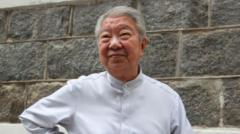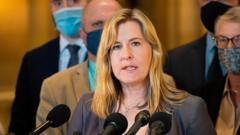With the national security law tightening its grip on Hong Kong, Innes Tang stands out as a polarizing figure, initiating a community surveillance system that reports alleged infringements. His actions ignite a controversial discourse on patriotism, civil rights, and societal divisions in a post-protest city.
Informant's Role in Hong Kong's National Security Crackdown: An Inside Look

Informant's Role in Hong Kong's National Security Crackdown: An Inside Look
Innes Tang, a former banker, reveals his motivations behind reporting numerous citizens to the police under Hong Kong's controversial national security law.
Innes Tang, a self-declared patriot and former banker, has taken it upon himself to report fellow Hongkongers to the police for alleged violations of the national security law (NSL). Using his personal funds, Tang established a hotline to collect tip-offs about activities he believes could infringe on the law designed to combat secession, subversion, and collusion with foreign forces. His vigilance has led to nearly 100 individuals and organizations reported since the law's implementation, highlighting a culture of informing that has emerged in the wake of the pro-democracy protests that shook the city in 2019.
Despite international criticisms of the NSL for stifling free speech and press freedoms, Tang insists that his actions are motivated by a deep love for Hong Kong. He believes he represents the "silent majority" who oppose the protests and seek stability. His belief in "community-police cooperation" and the efficacy of his reports are underscored by the fact that some cases have resulted in arrests and jail terms.
However, the environment is fraught with tension. The impact of such reporting has been profound, contributing to an atmosphere of fear as over 300 arrests have occurred under the NSL since its enactment. Scholars and activists report self-censorship as natural discourse becomes stifled, resulting in even academics being wary of discussing sensitive topics. Witnessing friends and colleagues become estranged due to political associations has been disheartening for figures like Kenneth Chan, who laments the loss of public discourse in the city.
With the legislative landscape altered significantly post-2021, only "patriots" loyal to the Communist Party are allowed to hold substantial government positions. Many view this development critically, suggesting it teams governance with public disapproval, seeing a lack of representation for the actual voices of Hong Kong's populace.
As protests dwindle to a halt, Tang now shifts his focus to international platforms, advocating on behalf of pro-Beijing perspectives while attempting to redefine his role in a quieter Hong Kong. His dual identity as informant and advocate blurs boundaries in a society struggling with its identity amid strict regulations. Meanwhile, academic independence remains tenuous, and with substantial portions of the populace having fled or faced arrest, the future for free expression hangs precariously in the balance.





















